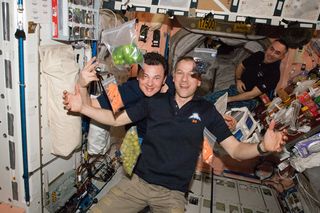Can You Keep Kosher or Halal in Space?

Astronauts on the International Space Station can't follow strict kosher or halal laws — or stay totally kosher for Passover — but the scientists at NASA's food lab have a few options for observant space fliers.
Space.com talked with Vickie Kloeris, manager of NASA's Space Food Systems Laboratory, about the space station crew's options. The food lab is based at the Johnson Space Center in Houston, and its researchers are responsible for developing menus as well as producing and packaging the actual food that flies to the space station.
According to Kloeris, purely kosher meals (food prepared according to Jewish law) or halal (food prepared according to Islamic law) aren't currently possible for the space station fliers. [Space Food Evolution: How Astronaut Chow Has Changed (Photos)]
"It has nothing to do with the space station per se; it has to do with our food production facility," Kloeris told Space.com. "We have a single packaging room on the U.S. side. All of the food that's part of our standard menu that we provide — from what I understand, in order for them to be kosher and halal, they have to be done in separate, unique facilities. Therefore, everything we package would not meet that requirement."
Kloeris noted that it's possible to travel with a limited allotment of kosher or halal foods, in order to honor an astronaut's heritage; every astronaut is allowed a certain number of crew-specific containers sent to the space station, which can account for about 10 percent of their diet.
The procedure was similar for the space shuttle, as well: Israeli astronaut Ilan Ramon, who flew on the space shuttle Columbia, took some kosher food with him on the shuttle flight, for instance. Kloeris said she wasn't aware of anyone who'd taken halal food specifically on a space journey.
Get the Space.com Newsletter
Breaking space news, the latest updates on rocket launches, skywatching events and more!
But the main limitation is the large amount of food that would be needed. If Kloeris' food lab were called upon to support a U.S. astronaut who was following a 100 percent kosher or halal diet, it would be a substantial undertaking to find and package food that met the dietary requirements and were satisfactory for a long stay on the space station.
"Most of these crewmembers are staying six months on the space station," Kloeris said. "It takes a lot of variety to support a person for six months on the space station without them just getting totally bored with what they're eating … We would have to be given a chunk of money to be able to go out and identify and procure and bring in commercial stuff that would support a crewmember in that situation."
During the spring holiday of Passover, observant Jews avoid food made from grain and water that can rise; an important Passover food, matzo, is made from wheat but does not have the chance to rise. The holiday lasts eight days, which means it could be possible to send up enough food to maintain the spirit of the holiday, Kloeris said.
"If we were to have a crewmember who wanted to take an unleavened bread product, we would send it right ahead, as close to the event as possible, and it would go up not as a part of our standard menu, but it would go up as part of their preference selection," Kloeris said. "It would be targeted for a specific time frame. It's not like with our standard menu food that has to have an 18- to 24-month shelf life, because it's going to sit on the station for a long time before it ever gets consumed."
These crew-specific menu containers are sent up on general cargo launches and can contain food that's fresher than the typical space station fare. For instance, on SpaceX cargo flights, food is packed about five to seven days before the Dragon spacecraft's launch. Most of each crewmember's specific member containers are set on the station by a cargo flight before the crewmember arrives, and so it doesn't have to stay edible for nearly as long.
Occasionally, NASA's food lab has had to accommodate astronauts with special food requirements, like lactose-free diets, by making use of those crew-specific containers, Kloeris said. However, such cases are rare, she added; most crewmembers who are cleared to fly might request lower-gluten or lower-lactose diets, but they don't require strict restrictions.
Email Sarah Lewin at slewin@space.com or follow her @SarahExplains. Follow us @Spacedotcom, Facebook and Google+. Original article on Space.com.
Join our Space Forums to keep talking space on the latest missions, night sky and more! And if you have a news tip, correction or comment, let us know at: community@space.com.

Sarah Lewin started writing for Space.com in June of 2015 as a Staff Writer and became Associate Editor in 2019 . Her work has been featured by Scientific American, IEEE Spectrum, Quanta Magazine, Wired, The Scientist, Science Friday and WGBH's Inside NOVA. Sarah has an MA from NYU's Science, Health and Environmental Reporting Program and an AB in mathematics from Brown University. When not writing, reading or thinking about space, Sarah enjoys musical theatre and mathematical papercraft. She is currently Assistant News Editor at Scientific American. You can follow her on Twitter @SarahExplains.
Most Popular


